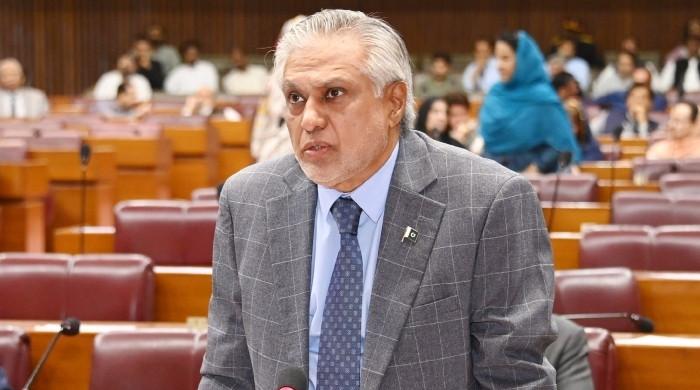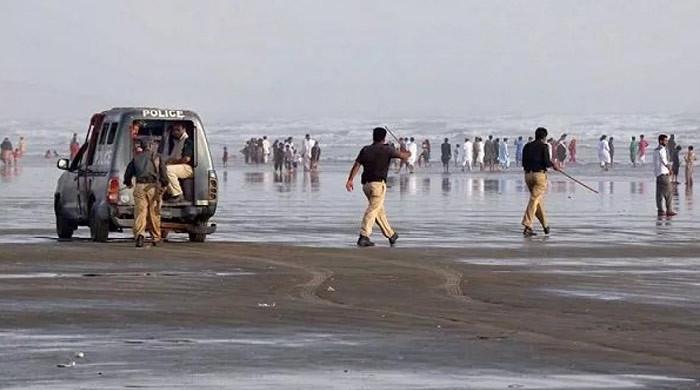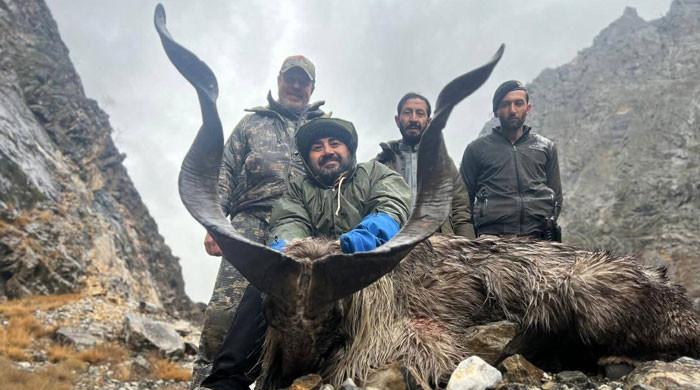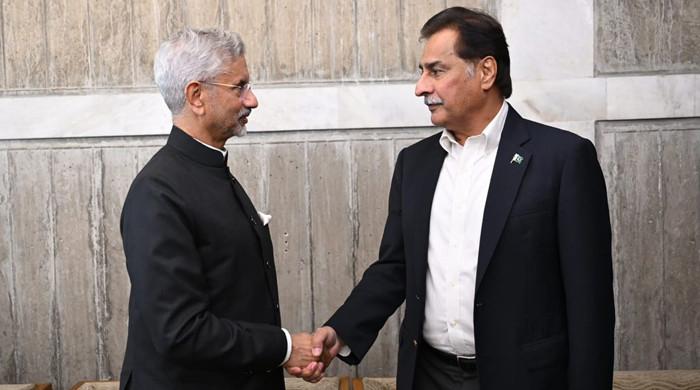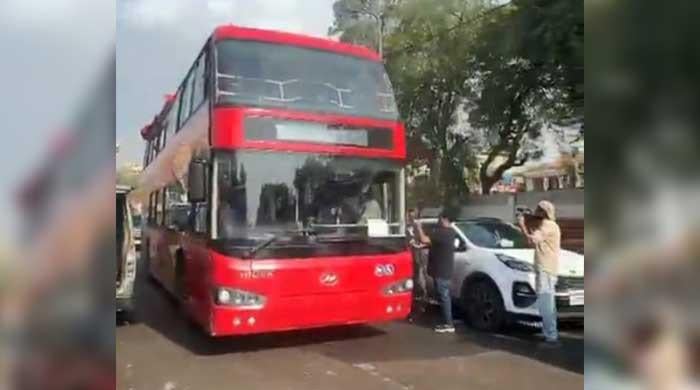The future of TLP in Pakistan’s politics
At the moment, the TLP is a banned entity for damaging public property and attacking law enforcement personnel
April 26, 2021
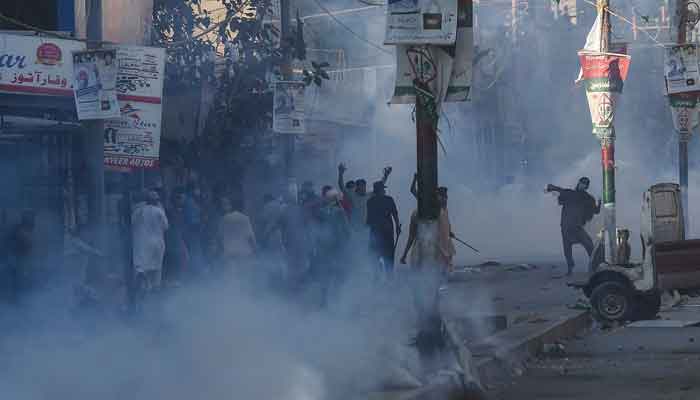
The Tehreek-e-Labbaik Pakistan (TLP) is here to stay.
Within three years of its formation, the religious right party has not only shown immense street power but it has also proven to possess the electoral strength to spring up surprises, such as the one in 2018 in Karachi’s Lyari when the TLP candidate raked in more votes than Pakistan Peoples Party's (PPP) chairperson.
At the moment, the TLP is a banned entity for damaging public property and attacking law enforcement personnel. Yet, its three members of the Sindh Assembly have not been disqualified. Not only that, but the TLP is one of the frontrunners in the upcoming by-polls in Karachi, despite internal squabbling.
For now, even the ruling party seems divided on the final fate of the TLP, as two views exist within the government - one group wants the ban to remain, while another wants it lifted.
The Barelvi vote bank
The political party secured over two million votes in the 2018 general election, an impressive run in the very first polls it had contested to date. The two political parties whose vote bank it damaged the most was the MQM-Pakistan in Karachi and the PML-N in Punjab.
For many experts, the sudden emergence of the TLP can be seen as an attempt to revive the politics of the Barelvi school of thought, since the fall of the Jamiat Ulema-e-Pakistan (JUP).
TLP banned: What does it mean?
While the TLP identifies itself as a religious party, it differs from other religious political parties in the country such as the Jamiat Ulema-e-Islam-F and the Jamaat-e-Islami (JI). In fact, the TLP stands to challenge the hold of these traditional parties.
Back in the 1970s and 80s, there were only three prominent religious parties – the JUP, JI and the JUI. But the two Afghan wars, one against Soviet and the other against the US, resulted in the rise of an extremist narrative amongst the Deobandi school of thought. Maulana Shah Ahmad Noorani, the most prominent leader of the Barelvi school of thought, who also led JUP, was against Pakistan's interference in Afghanistan and also the 'Afghan jihad.'
I still remember his reaction to one of the deadliest twin bomb blasts near his house in Karachi’s crowded Saddar Bazar on July 14, 1987, killing more than 150 people.
“We will all pay the price for our role in Afghanistan for years to come,” he said soon after the blast.
In those days, the politics of religious parties like JUP and JI, which once dominated urban politics of Sindh in general and Karachi in particular, was on the decline. Both religious parties faced back-to-back defeats in the 1985 non-party based election, the 1987 local bodies polls and later the 1988 general election.
This happened despite Noorani, Maulana Mufti Mehmood of JUI and Prof. Ghafoor Ahmed of JI playing leading roles in the framing of the 1973 Constitution. In a rare show of unity, these parties had joined hands with liberal and secular parties the PPP and the National Awami Party to make it a consensus document.
The rise of political violence
Politics by and large in Pakistan remained non-violent until 1979. But then there was a revolution in Iran, after which the Soviet intervention in Afghanistan followed.
The martial law government led by General Ziaul Haq decided to be a part of the coalition and global jihad in Afghanistan. Thousands of mujahideen were sent to Pakistan from Arab countries, who never returned to their respective countries after the Soviet withdrawal.
Then in 1994, when then Prime Minister Benazir Bhutto’s second government handed over 300 Egyptian mujahideen to the Egyptian government. In retaliation, the Egyptian embassy in Islamabad was blown-up.
Some of the documents recovered from the US embassy in Tehran, after it was taken over by Iranian students, revealed details of how militants were armed and militancy injected in our local politics and campuses during the war.
Pakistan could not recover from the price it paid after the first Afghan war. And as if that was not enough, we repeated the same mistake when we got ourselves involved in the second Afghan war which attempted to capture al-Qaeda leader, Osama bin Laden.
In an interview to me, given a few years back, former army chief General Mirza Aslam Beg said: “In both Afghan conflicts we committed the same mistake. We become part of a war which was not ours.”
The two main religious parties in Pakistan which joined the first Afghan war were JUI (F) and JI, while the JUP kept itself out from the Afghan jihad.
Read more: Over 100 TLP clerics' names added to Punjab's fourth schedule list
But in the second Afghan war, the JUI and JI did not become part of any group or send their ‘holy warriors’ to Afghanistan. Although they did provide logistical and political support to the Taliban.
After political parties JUP and JI took a back seat, they lost their support base, while the JUI continued playing on both sides of the wicket.
A united religious vote bank
The second Afghan war also changed the political dynamics in Pakistan, as for the first time it emboldened the religious political parties to form the Muttahida Majlis–e–Amal (MMA) an alliance of religious parties. The MMA to the surprise of many secured 59 seats in the national assembly in 2002 and formed a government in the Khyber Pakhtunkhwa province.
For the first time in the history of Pakistan, the religious parties through an alliance emerged as the third largest group in parliament. The win was a natural outcome of the anti-US sentiments in the country then.
However, the MMA could not sustain its strength and lost its credibility when it collaborated with General Pervez Musharraf and agreed on a Legal Framework Order, 2002. Soon after, differences emerged between the JUI and JI in particular, which resulted in the split of MMA. In 2008, they lost the election.
On the other hand, jihadi outfits like the Jamaatud Dawa and Jaish-e-Muhammad were banned in 2002.
Hafiz Saeed, the head of JuD, had opposed the parliamentary system. In 2008, he declined a request from the MMA to join them and even went as far as to ask his party workers to not cast their vote as he was against the very concept of western democracy.
Interestingly, post 2008, he softened his stance towards democracy and tried to join mainstream politics.
Extremism in politics
In the last 40 years, the extremism injected in our politics has deeply impacted the youngsters affiliated with the JUI-F, JI and JUP. Several young men turned to terror groups like the al-Qaeda and Daesh. Maulana Fazlur Rehman himself has survived at least three suicide attacks.
In the ranks of the Barelvi party, after the death of Maulana Noorani and Maulana Abdus Sattar Niazi, the JUP could not emerge as a strong player. In fact in a bid to counter MQM’s muscle power, the young Saleem Qadri formed a new group from among JUP called the Sunni Tehreek. This divided the Barelvi vote bank further. Qadri was later assassinated.
Read more: Govt decides to ban TLP under anti-terror law
After 2007, there were a series of devastating attacks on shrines in Pakistan, which led to the Barelvi followers developing reactionary tendencies. Then in 2017, out of nowhere, firebrand speaker Allama Khadim Hussain Rizvi suddenly appeared on the scene with his organization the TLP.
The year of the TLP
For many, 2018 was the year of Imran Khan, who had been struggling to come to power for over two decades. But 2018 was also the year of the TLP, a new entrant which quickly established itself as the fourth largest party in terms of votes received.
Many political observers also see the rise of TLP as the revival of the strong Barelvi sect which due to two Afghan wars and rise in militancy had taken a back seat.
While it will not be easy to find leadership of the stature of Maulana Shah Ahmad Noorani or Maulana Abdus Sattar Niazi, the TLP today is in a much stronger position on the electoral front both in Punjab and urban Sindh.
I will not be surprised if it performs well in the Karachi by-polls or the local body elections.
Abbas is a senior columnist and analyst of GEO, The News and Jang. He tweets @MazharAbbasGEO




